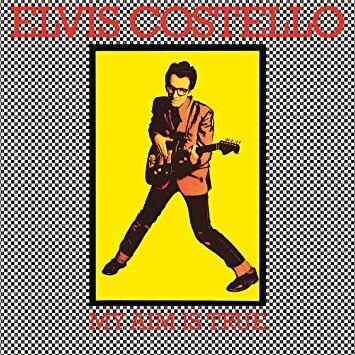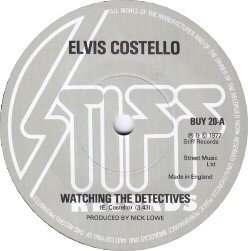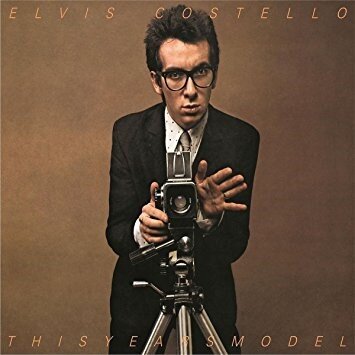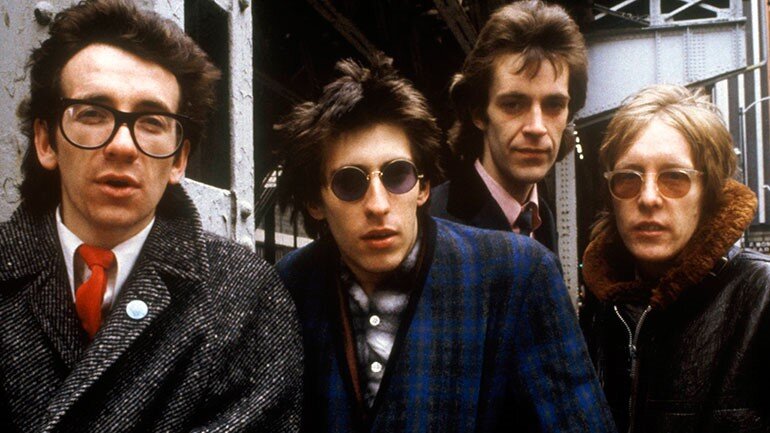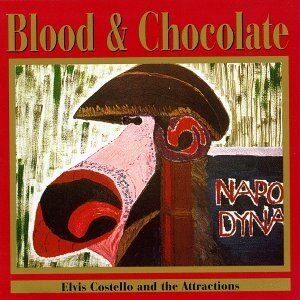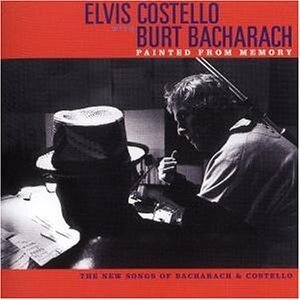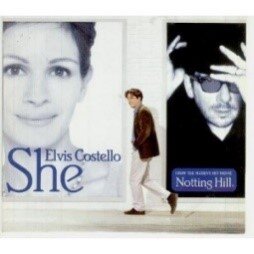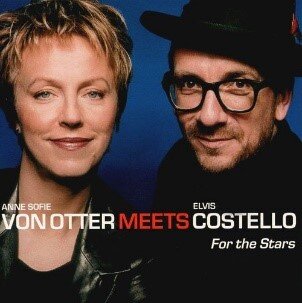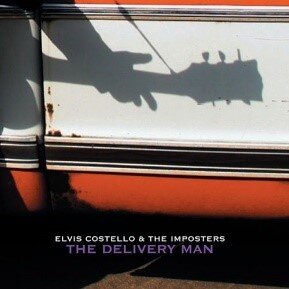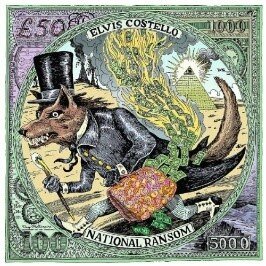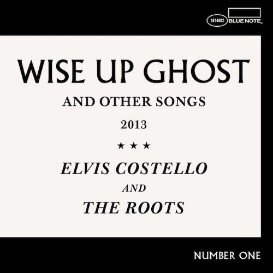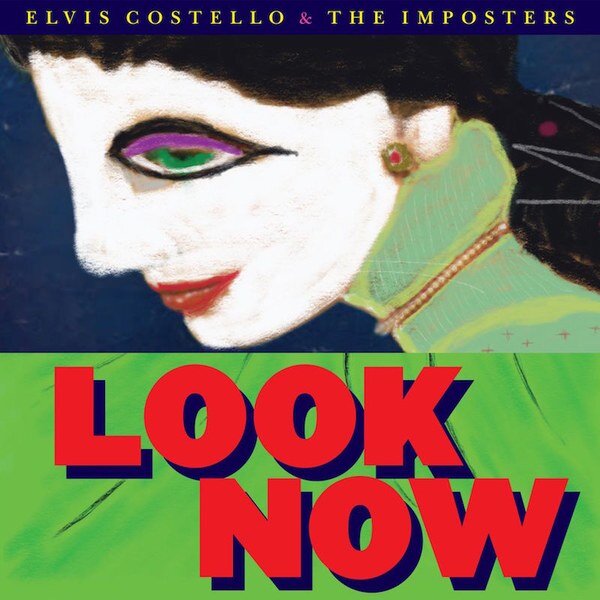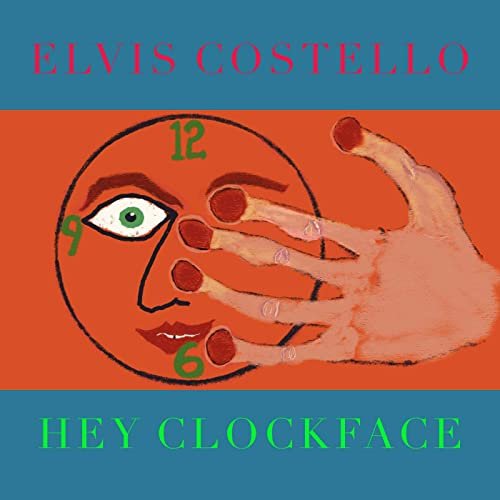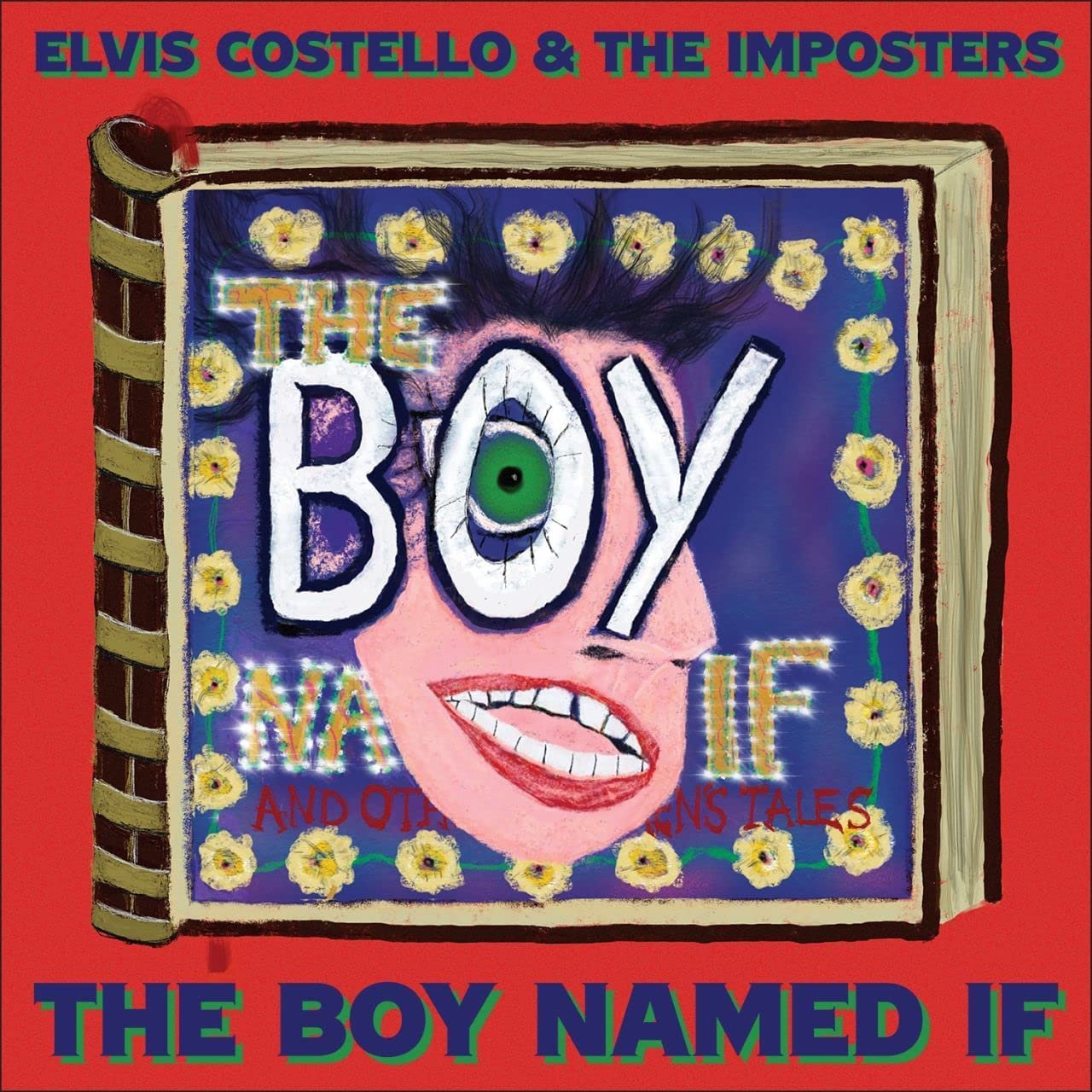My Aim is True: An Elvis Costello Retrospective
Click below on the streaming service of your choice to listen to the playlist as you read along. This profile was originally published in 2019 and then updated in 2022.
Few artists have produced the volume and consistency of one Declan McManus, popularly known as Elvis Costello. Perhaps only a solo artist could do this? When I think of who else has produced as steadily for forty years, only solo artists come to mind, such as Bowie, Neil Young, Springsteen, and Elton John. Sure, The Rolling Stones are still going but have only produced four albums over the past twenty-eight years – Costello has issued eighteen albums over those same years plus five live albums. Other older acts still making the rounds? Most have recently reformed after long breaks or have released little to no recent new music. Elvis Costello has released new albums reliably every year or two for forty-five years.
Costello has also covered a lot of musical ground, though most of his work has been rooted in standard, American-bred R&B. I suspect by the latter stages of this playlist you’ll have forgotten the early, nerd-punk music that kicked it off, though that is the work that still largely defines him. Yet, even in the later work, every now and then there is a burst, a song or a riff that will make you go – oh yeah, this guy rocks!
The Playlist
Less Than Zero
Welcome to the Working Week
Alison
(The Angels Wanna Wear My) Red Shoes
Watching the Detectives
Pump It Up
(I Don’t Want to Go to) Chelsea
Talking in the Dark
Big Tears
What’s So Funny ‘bout Peace, Love & Understanding
Radio Radio
Tiny Steps
Accidents Will Happen
Oliver’s Army
Green Shirt
I Can’t Stand Up for Falling Down
Riot Act
Clubland
New Lace Sleeves
A Good Year for the Roses
Beyond Belief
Man Out of Time
Everyday I Write the Book
Shipbuilding
The Only Flame in Town
I Wanna Be Loved
Brilliant Mistake
Don’t Let Me Be Misunderstood
I Want You
Veronica
The Other Side of Summer
So Like Candy
Expert Rites
Sulky Girl
Complicated Shadows
God Give Me Strength
She
For the Stars
15 Petals
Tear Off Your Own Head (It’s A Doll Revolution)
Monkey to Man
Church Underground
Walk Us Uptown
Come the Meantimes
Burnt Sugar is So Bitter
I only saw Elvis Costello for the first time in July 2017 for a show that focused on his seventh LP, 1982’s Imperial Bedroom. Seeing him live was overdue given I’d grown up listening to his music. But that’s the thing about him – he’s solid, reliable, brilliant at times, and yet seems to have ridden along for most of his career just outside the limelight. He’s had hits, most music fans would know his name and some of his tunes, critics generally love him, fellow artists sing his praises and flocked to appear on his TV show back in 2008-10, yet how quickly would you reach for his name to list as one of the all-time greats or as a highly influential, groundbreaking or prolific artist? I think he deserves a high level of appreciation, but it also seems he’s not one to have legions of die-hard fans holding the light up for him the way other artists of his ilk have achieved. So, let’s give him his due and recognize the incredible career of this enigmatic and studious performer.
Less Than Zero; Welcome to the Working Week; Alison; (The Angels Wanna Wear My) Red Shoes \ My Aim Is True (1977)
Born in England and of Irish descent, MacManus was raised in Twickenham, a western suburb of London. His father was a bandleader and musician, which explained the deep respect for music history Costello has shown throughout his career. After a brief spell in Birkenhead, across the Mersey from Liverpool and where he first started playing in bands, he returned to London and started playing the pub circuit.
Now, I love pop music. There is nothing better than a tightly written, two- to three-minute song with a good hook. In the late 70’s as pop and rock music was fracturing into hard rock, metal, prog rock, disco, and punk, there was also a wave of bands that stuck to producing straight-ahead pop songs with a good groove and strong rock edge. Pub rock was the category for much of this sound while also providing the launching ground for punk and ska bands. Many of these bands were signed by the indie label, Stiff Records, as was Costello, who adopted his performing name as a tribute to his father who had performed as ‘Day Costello,’ and Elvis Presley, who died just five months after Costello’s career started.
As far as first albums go, Elvis’ debut, My Aim Is True, was about as strong as they came. “Less than Zero” was the first single released and was a sign of things to come, though didn’t gain much traction. But as more singles were released, their consistency started to bring attention to Costello, resulting in a controversial appearance on Saturday Night Live in December that year (more on that later) and Rolling Stone magazine naming the LP one of the year’s best. The album paved the way for success for Elvis, charting in the top twenty in the UK and the top forty in the US.
The album’s songs were consistent with the Stiff Records’ sound. Tight pop songs drawn straight from the late 50’s and early 60’s Motown and British Invasion sounds. There was a modern edge to the compositions and production quality, with slightly rawer guitars and deeper rhythm sections; but were still toe-tapping, hooky, sing-along ditties. Sure, there were some pointed lyrics and a little politics, but that didn’t get in the way of the fun. The album was one of the higher profile and essential releases of the explosion of modern rock that year.
Watching the Detectives \ non-album single (1977)
Released as his fourth single, “Watching the Detectives” was the lever that lifted Elvis out of the pubs and into larger awareness. Produced by labelmate, Nick Lowe, another emerging legend of the pop scene of the time, the song was Elvis’ first charting single and a minor success in North America. It most notably integrated a reggae riff, and the use of Jamaican rhythms helped pave the way for the second wave ska scene, which Elvis helped launch by producing The Specials’ debut album two years later.
“Watching the Detectives” wasn’t included on My Aim is True, being released after the album but in between singles from that LP. The US version of the album included the song in later issues.
Pump It Up; (I Don’t Want to Go to) Chelsea \ This Year’s Model (1978)
The second LP, This Year’s Model, was infected with the spirit of punk and modern rock, more aggressive yet no less catchy. Costello had now gathered a band around him, The Attractions, featuring Steve Nieve’s distinctive organ sound (first noted in the reggae flavour from “Watching the Detectives”). Costello was also an intriguing sight. Bespectacled in heavy-rimmed glasses, wearing tight suits and dancing in a jerky, pigeon-toed style, his nerd-punk style gave him a distinct image. This album got him more attention and was his first to crack the UK top ten, the first of eight consecutive LPs that would do so. “(I Don’t Want to Go to) Chelsea” was his second top twenty single, though arguably it was “Pump It Up,” which reached #24 in the UK singles chart, that would have more staying power in becoming one of Costello’s defining songs.
Talking in the Dark; Big Tears; What’s So Funny ‘bout Peace, Love & Understanding; Radio Radio; Tiny Steps \ non-album singles & B-sides (1978)
A still from Elvis’ controversial performance on Saturday Night Live
In December of 1977, Costello and the band concluded their breakout inaugural year with an appearance as the musical guest on Saturday Night Live. He wanted to play, “Radio Radio,” a new, unreleased song complaining about the BBC’s penchant for banning songs – particularly the new batch of punk tunes coming out, most notably that summer’s Sex Pistol’s song, “God Save the Queen.” Not wanting to air an indictment of broadcast radio, NBC forbade it from being played. The decision was supported by Costello’s American label, Columbia Records, who instead wanted him to play “Less Than Zero” to support the American release of My Aim Is True. The band started to play “Less Than Zero” before Elvis stopped it and had them play “Radio Radio” instead. As a result, he was banned from the show, not to return for another ten years. The minor controversy gave him some notoriety and helped increase his exposure in the US as he entered into another productive year in 1978. In addition to the second LP, Costello and The Attractions also issued a steady deluge of outstanding singles, B-sides, contributions to Stiff Record compilations, and a movie soundtrack. His knack for impeccable melodies, simply delivered and marked by his distinctive and solid vocals, created an impressive list of songs all in the same year.
Costello paid homage to the past by subtly covering Burt Bacharach’s, “I Just Don’t Know What to Do with Myself” (he would work with Bacharach later in his career), in “Big Tears” he offered expansive, bombastic beats, and in “What’s So Funny ‘bout Peace, Love and Understanding,” delivered a blistering and definitive version of the Nick Lowe (who produced the track) track from his band, Brinsley Schwarz. Originally issued as a B-side to a Lowe track, “American Squirm,” when it became a hit it was quickly appended to the US release of Costello’s next album, Armed Forces. Many of these Costello songs were later packaged into a fantastic compilation in 1980, Taking Liberties.
Accidents Will Happen; Oliver’s Army; Green Shirt \ Armed Forces (1979)
Now a regular hitmaker and only two years into his career, Elvis barely took a moment to rest and released yet another LP of relentlessly listenable tunes, Armed Forces. His second with The Attractions, the band provided smoother performances (piano featured more than organ) and the songs had a more polished feel. The melody and Elvis’ consummate pop sensibilities shone through in songs like, “Accidents Will Happen,” subtle hooks and a jaunty piano paced, “Oliver’s Army,” and “Green Shirt” played on a taut pulse punctuated with sharp drums beats.
After three albums Costello was defying categorization. He wasn’t quite punk and there was too much attitude to be pop (though the song structures definitely fit that genre, not to mention the catchy and danceable sound). Punk was starting to fade by this time in England and new sounds were emerging in the post-punk era. Along with Costello, other acts like Joe Jackson and The Jam were forging a new brand of aggressive, soulful, guitar and piano/organ British pop and it was catching on. “Oliver’s Army” was Elvis’ first single to reach the UK top ten.
I Can’t Stand Up for Falling Down; Riot Act \ Get Happy! (1980)
Clubland; New Lace Sleeves \ Trust (1981)
A Good Year for the Roses \ Almost Blue (1981)
Elvis started the ‘80s with a more upbeat sound on the next album, Get Happy!, diving further into a pure soul vibe and even covering a Sam & Dave standard, “I Can’t Stand Up for Falling Down,” which brought him another top ten UK single. The next single, “High Fidelity,” was okay but seemed watered down compared to the angry and edgy mold of the first three LPs. “Riot Act” had a little more of the Elvis hook and showed his proficiency with mid- to lower-tempo songs – though he’d already established himself as being versatile in that regard with songs like “Alison” and his well-known cover of “My Funny Valentine.”
Never breaking step, the band released their next single, “Clubland,” before 1980 was out. It was the first single from their next LP, Trust. Nick Lower produced it, as he had the first four LPs. The album moved back a bit toward Costello’s sound from his first three albums but lacked a definitive hit. However, “New Lace Sleeves” again provided an elegant mid-tempo song in which Elvis’ voice was so perfectly suited. The other single, “From a Whisper to a Scream,” was the first not to chart in the UK since he’d first gained that foothold with “Watching the Detectives.”
Almost Blue followed later the same year, an album of cover songs of American country songs. It was recorded in Nashville and was the first not helmed by Lowe. “A Good Year for the Roses” was a George Jones song and returned Costello to the top levels of the UK chart, scoring his third and final top ten single in the UK. It’s a surprising fact to me that he has never had a #1 hit. It was also unexpected, given the softened success of Trust, that he was able to rebound via an album that was a departure from his form.
Beyond Belief; Man Out of Time \ Imperial Bedroom (1982)
Returning to his pop and R&B sound, Elvis was settling into a consistent but less remarkable artist than his first releases had established. 1982’s Imperial Bedroom was his seventh album, which when combined with compilations of additional material and twenty singles over his brief five-year career, set a pace of output that had been common in the ‘60s and ‘70s but not so much for artists of the ‘80s, and I don’t doubt music fans were struggling to digest it all. There were still great songs, and his music was still solid, but the energy and excitement of his first releases were gone and he was treading safe ground with well-written and performed pop songs. Regardless, his music remained critically acclaimed and continued a moderate success – more so with the albums than the singles and mostly in the UK – and was sustaining a solid audience in the US and, especially, Canada.
“Beyond Belief” and “Man Out of Time,” however, were two of his best songs yet, again showing his knack for sublime and affecting melodies that grabbed you with subtle changes more than in-your-face guitar and piano riffs. The hushed vocals of “Beyond Belief,” riding on the building rhythms of the organ, guitar and drums, made for the quintessential Elvis Costello listening experience. And just when you were in a ‘what comes next?’ vibe, the song ended, leaving the suggestion you’d been denied something big that the song had been building towards but never came, which created a bit of a lament – indeed, feeling beyond belief of what this song achieved for a simple pop song. “Man Out of Time” opened and closed with an odd scherzo-like, screeching rock sound, as if this was recorded over another song from his early days, but in between settled into a beautiful, melodic song that was becoming the Elvis Costello trademark. Was Elvis paving over his youthful, wilder self?
This album was also notable in that he didn’t return to Nick Lowe to produce, instead using Geoff Emerick, who had worked as an engineer on many Beatles albums and was concurrently engineering Paul McCartney’s Tug of War album (best known for the duet with Stevie Wonder, “Ebony and Ivory”). The similarities to McCartney’s music on this album were evident. Also of note was the song, “Almost Blue,” which was a tribute to trumpet player Chet Atkins, who would guest on his next album. This LP was also the one featured in the 2017 concert that I attended, and while the overall concert was a mixed result, getting to hear many of the songs from this album was a treat.
Everyday I Write the Book; Shipbuilding \ Punch the Clock (1983)
Punch the Clock picked up right where Imperial Bedroom left off. “Everyday I Write the Book” was one of Costello’s most perfect pop songs and resulted in his first top forty hit in America. Oddly, Costello would fall out of love with this song and stop performing it for years, before being brought back to it by Toronto singer Ron Sexsmith, who often covered it in concert. You can hear them perform it together on Costello’s TV show, Spectacle, in 2009, though unfortunately there’s no clip available that includes the story behind it prior to their performance.
“Shipbuilding” had a Chet Atkins solo, bringing the beauty of Costello’s soft sound to another, jazz-infused level. This exquisite song was, ironically, about the resurgence of shipbuilding in England as a result of the 1982 Falkland Islands conflict with Argentina.
Costello had established a strong following in North America, with all his LPs having cracked the top forty to that point, but only Armed Forces reached the top ten. His singles fared less well, usually not reaching the main singles chart. “Everyday I Write the Book” changed that with its top forty achievement.
The Only Flame in Town; I Wanna Be Loved \ Goodbye Cruel World (1984)
If you were coming of age in the mid-‘80s, as I was, you would have thought that this period was the height of Elvis Costello’s career. With songs like, “The Only Flame in Town,” steeped in the standard ‘80s light-pop sounds, marked with sax bursts and horn punctuations and lightly sprinkled with some synthesizers, he seemed like part of the zeitgeist of modern pop music. My brother had that first LP, My Aim Is True, with the unlikely looking, pigeon-toed guy on the cover in heavy-rimmed glasses – but it would not have occurred to me that album was by the same guy, much less issued only seven years prior, or that he’d been part of the early wave of late ‘70s modern rockers who was now nearing veteran status.
Goodbye Cruel World was the eighth straight album of Elvis’ to reach the UK top 10, all of them with The Attractions as his backing band. While his singles continued to achieve little chart success, his albums reliably moved units. And while we’re tracking things, his string of releasing a record every year – or sometimes two – was intact for the seventh straight year.
Regardless the style or state of Costello’s sound, on every album there was still a moment of glory, the one or two songs that made you stop and just… listen, and hum softly in the caress of his distinctive and always melodic voice. “I Wanna Be Loved” was yet another of those beautiful, smooth, mid-tempo songs for which Costello was a master. A light chorus of vocals, rolling bass lines, a shimmering synth line and twinkling piano, that ‘80s sax, and Elvis singing with a lament, made for a wonderful mood that was perfectly captured in the memorable video, in which his implacable face was kissed repeatedly by others. It was a song that could be easy to forget in his vast repertoire, yet it was one of his many gems that, even today, I never tire of listening.
Elvis with The Attractions: Steve Nieve, Pete Thomas, and Bruce Thomas
Brilliant Mistake; Don’t Let Me Be Misunderstood \ King of America (1986)
What’s this? Did Costello take a year off? Well, sorta. In 1985 he released not one but two greatest hits albums, one of which included, “Green Shirt,” as a single (it wasn’t a single when Armed Forces was released) and a new single, “The People’s Limousine,” that would be included a couple years later in a compilation of unreleased tracks over his career (really?), Out of Our Idiot. So, he wasn’t totally out of the picture, but it was the first year of his career in which he didn’t release a new studio album.
I bought 1986’s King of America through my Columbia House Records membership, receiving the album in the mail along with another batch of eleven records for one cent. I didn’t own any Costello until then but had been listening to him on the radio for years and had exhaustively listened to my brother’s copies of My Aim Is True and Taking Liberties, so I figured it was time to close that gap. I listened to King of America a couple times and filed it away, finding it boring compared to my New Order albums. I’ve carried this impression of it being a lousy album around in my head ever since. It’s not. Costello has even suggested it’s his favourite.
What threw me off back then was my hope for the punk-pop excellence of his early tunes. What I didn’t know was that Costello had been touring with T-Bone Burnett on solo tours and was writing songs more in the vein of American blues, folk, country, and bluegrass. He went into the studio and recorded with some of Elvis Presley’s backing musicians and started identifying himself and his different band combinations under various names such as The Confederates, The Elvis Costello Show, his own name, Declan MacManus, Napoleon Dynamite, and of course, The Attractions.
Among these iterations and musical samplings, his first single was a cover of Nina Simone’s, “Please Don’t Let Me Be Misunderstood,” another fantastic interpretation of an older song by this student of music history. “Brilliant Mistake” was another of his impeccable compositions. For my teen self, what was missing was the keyboards, sax and other elements that had marked his several prior albums. There was no single equal to “Everyday I Write the Book” or “I Wanna Be Loved.” I felt let down. Yet, the album was full of great compositions and performances, showing the increasing versatility that Elvis could explore with his talent.
I Want You \ Blood and Chocolate (1986)
After another, almost expansive, two-year gap between albums, of course Costello issued two in the same year. I love the name of his next album, Blood and Chocolate (I don’t know why, it just sounds cool). “Tokyo Storm Warning” was drawled out reminiscent of Dylan’s “Subterranean Homesick Blues” and had all the attitude and swagger of early Costello. Why hadn’t I waited to buy this album instead? “I Want You” was a slow ballad filled with the usual Costello hooks, carried by his voice and a bluesy guitar and bass. It was the perfect song to put on that mixed tape for the girl in class that you wanted, but were too shy to ask out… (I guess today you’d text it to her?)
Perhaps coming out too soon after his prior album, and lacking a song that would grab the masses, Blood and Chocolate was his lowest selling record to date. That aside, he had returned to Nick Lowe as producer and once again was fully backed by The Attractions. This was their eighth album together, not including King of America, for which they’d performed on some of the songs.
Veronica \ Spike (1989)
Other than the aforementioned compilation, Out of Our Idiot, Costello did not release a new album for another three years – by far his longest stretch of inactivity. There was a single (included in the compilation), “A Town Called Big Nothing,” released in 1987. He also got married for the second time to Cait O’Riordan, the bassist for The Pogues, whose 1985 breakout album, Rum, Sodomy and The Lash had been produced by Costello.
Elvis was also hanging out with Paul McCartney. They co-wrote several songs that appeared on the ex-Beatle’s album, Flowers in the Dirt, as well as on Costello’s LP, including the single “Veronica,” which would be just his second top 10 single in the US. “Tramp the Dirt Down” was a lament for the years of rule under British Prime Minister Margaret Thatcher.
However, the most notable change on the album was the absence of The Attractions. After having already dabbled during King of America in recording with other artists, and due to ongoing tensions with some of the band members and Costello, the decision was made to go solo again. T-Bone Burnett was again a collaborator and as recording returned to the American heartland. Finally, there was a move from Columbia to Warner Brothers, a label change that provided much better funding for recording and promoting his music; which was perhaps why “Veronica,” a rather plain effort for Costello, became a his only top twenty hit in the US. It was also the last time he charted a single in the top 100. The single cracked the top forty in the UK, a feat he would only achieve two more times in his career thereafter.
The Other Side of Summer; So Like Candy \ Mighty Like A Rose (1991)
Costello was now issuing music at a more leisurely pace of every two years. However, this didn’t help his output as the music settled into a solid, but unremarkable, list of songs such as “The Other Side of Summer” and “So Like Candy.” All the trademark Elvis elements were there, but it was starting to blend together into an endless stream of sameness. Like most artists, the change into a new decade, particularly one launched with several new scenes of music from Seattle, Manchester, Detroit, and others, left Costello fighting the natural image of a has-been. Indeed, most ‘80s artists fell out of favour in the ‘90s, and either hung on to be re-discovered in the 2000s or broke up and then reformed when their music regained the interest of fans. Costello carried on, undaunted.
German director Wim Wenders put out an intriguing (if a bit long and boring) sci-fi movie, Until the End of the World, which had an excellent soundtrack of mostly ‘80s artists (the title track was from U2’s new LP, Achtung Baby). Costello’s contribution was an excellent cover of The Kinks’ song, “Days.” His other project that year, also related to film and TV, was providing the music, in partnership with Richard Harvey, for the mini-series, G.B.H. Venturing into orchestral and instrumental music, the project won Costello a BAFTA award.
Expert Rites \ The Juliet Letters (1993)
Sulky Girl \ Brutal Youth (1994)
Costello continued to explore new musical ground by writing and performing, The Juliet Letters, an album of classical music with the Brodsky Quartet. Built around fictional letters to Shakespeare’s famous female character, the album presented a different dynamic for Costello’s voice having to work against the dramatic and subtle variations of the strings. While many artists late in their careers experiment with different styles, few attempt such a departure. The album was critically lauded and did surprisingly well, cracking the top twenty on the UK charts.
The next LP also had an unexpected turn as he brought back The Attractions. Back in form with a stronger rock sound, Brutal Youth was his best-selling since Punch the Clock in 1983. His split with The Attractions had been based on issues with bassist Bruce Thomas. Seemingly smoothed over, Elvis’ return to the band made it apparent how his work benefitted from their involvement. “Sulky Girl” sounded like something that would have fit on one of his early albums such This Year’s Model or Armed Forces
Complicated Shadows \ All This Useless Beauty (1996)
God Give Me Strength \ Painted from Memory (1998)
1995 saw Costello issue two albums. Kojak Variety was an LP of cover songs while Jake’s Progress was another soundtrack again written with Richard Harvey.
The next year, he returned to working with The Attractions on what would be his final album with them (sort of) as his relationship with Bruce Thomas had reached an end. All This Useless Beauty also completed his contract with Warner’s. Less aggressive than the prior LP, though “Complicated Shadows” had its rockier moments, the album was more of a folk-based effort. “I Want to Vanish” most closely resembled his work on The Juliet Letters. “The Other End of the Telescope” was written with Aimee Mann and had originally been recorded by her band, ‘Til Tuesday.
The 1990s was a decade in which Costello seemed either uncertain with where to take his career or was simply following his muse, enjoying the freedom and prerogative of an established artist with a stable following. After several albums of increasingly indistinguishable pop songs, he’d moved through orchestral music, classical string arrangements, rock, pop, folk, and country. As the decade reached its conclusion he again ventured into a different form with his final album of the decade, a duet with legendary songwriter Burt Bacharach. The songs on Painted from Memory had the unmistakable touch of the veteran songwriter working in the easy listening mold. Costello had clearly long been a fan of Bacharach’s, having first covered his music in 1978 with “I Just Don’t Know What to Do with Myself,” and then again recently with “Please Stay” from 1995’s Kojak Variety.
She (1999) & For the Stars (2001) – non-album releases
15 Petals; Tear Off Your Own Head (It’s a Doll Revolution) \ When I Was Cruel (2002)
Still exploring song styles and artists of decades past, Costello contributed a cover of Charles Aznavour’s 1974 song, “She,” for the Notting Hill soundtrack. He then spent the first few years of the new millennium working with and guesting on others’ work, spending a residence at UCLA (where he wrote a ballet), and appearing on the TV shows, The Simpson’s and Frasier. Among these projects was producing and performing on an album, For the Stars, by Swedish classical singer, Anne Sofie von Otter.
Elvis formed a new backing band, ironically named The Imposters, given it was The Attractions without Bruce Thomas. When I Was Cruel represented a return once again to straight-ahead rock ’n’ roll, which Costello seemed to revisit every few albums, as if anchoring himself before venturing off into his musical flights of fancy. “15 Petals” was a bit of a remarkable entry compared to his other work. Urgent and frenetic, punctuated with exotic, jazzy horn blasts, it brought many of Costello’s elements together in one song, except for perhaps his melodic touch. “Tear off Your Own Head” was a tough, guitar-driven rocker unlike any we’d heard from him in many years.
“Monkey to Man” \ The Delivery Man (2004)
“Church Underground” \ National Ransom (2010)
“Walk Us Uptown”; “Come the Meantimes” \ Wise Up Ghost (2013)
“Burnt Sugar Is So Bitter” \ Look Now (2018)
“No Flag” \ Hey Clockface (2020)
“My Most Beautiful Mistake” \ The Boy Named If (2022)
Elvis Costello’s music and career in the new millennium has been that of the aging hipster, enraptured with the old while embracing the new. He has stayed as busy as ever, releasing eleven albums over the past twenty years (and two more between the original publication of this profile and the update not even three years later). There has been nothing in these albums we haven’t already heard from him before, and he has continued to cycle through rock, pop, country, soul, classical, jazz, and folk. His 2013 album, Wise Up Ghost, was probably his most intriguing and enervating. Working with the band The Roots, it was his most energetic and engaging in quite some time, especially following the rather downbeat collection of songs on the prior effort, National Ransom.
In 2018, he concluded the longest recording break in his career – five years – issuing his 30th LP, Look Now. It was the third recorded with The Imposters and had new songs co-written by Burt Bacharach. The song, “Burnt Sugar Is So Bitter,” was co-written with legendary songstress, Carole King, who herself was enjoying a resurgence thanks to a touring musical based on her music. It was followed by Hey Clockface, which featured some modern sounds, and The Boy Named If, which was again with The Imposters. These LPs have been some of his most accessible in a decade.
After splitting with Cait O’Riordan after sixteen years together, Costello got married for the third time in 2003, this time to Canadian jazz singer, Diana Krall. They are still together and had twins in 2006. It was likely her influence that led to his album, Piano Jazz, in 2005. Elvis also hosted a TV show, Spectacle, from 2008 to 2010, in which he interviewed and performed with a variety of musicians. It was a good vehicle for him to entertain and cycle through all his musical styles, while showing off his encyclopedic musical knowledge and sense of history. Aside from that he has also written and produced others’ music and continually pops up as a guest in shows, concerts, and recordings. He has also toured regularly, resulting in the 2017 show that I saw (he’s on tour again in 2022).
It's this relentless energy that is most intriguing about Costello. A consummate songwriter and performer with an admirable consistency, his career has been hard to track as he’s bubbled under the surface, seemingly always there. It’s been more than a few times over the years that I’ve found myself surprised that he’s still around and still putting out music. He’s ceased to be relevant, really, for quite a long time, though remains respected and admired by fellow musicians as well as critics, which is nothing to scoff at. Indeed, he is now up to 32 albums and 62 singles over forty-five years – a level of output matched by very few in the pop-rock realm. Despite the admiration of many, he has not been a particularly ground-breaking or innovative artist – though his first few albums were unquestionably at the fore of the zeitgeist of the emerging modern rock universe. His music is always familiar, both in form and from his immediately identifiable voice, even when he’s venturing into the more distant realms from his core R&B sound. Reliable, entertaining, good, sometimes great, and someone who clearly loves music and his place in it. Elvis Costello.






